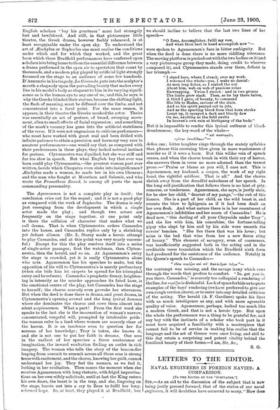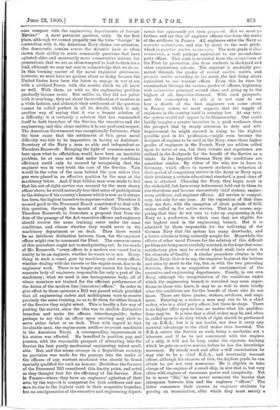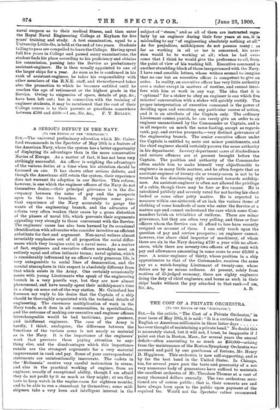LETTERS TO THE EDITOR.
NAVAL ENGINEERS IN FOREIGN NAVIES: A COMPARISON.
[To THE EDITOR OP TILE "SPECTATOR.")
Six,—As an aid to the discussion of the subject that is now being justly pressed forward, that of the status of our naval engineers, it will doubtless have occurred to many, " How does
ours compare with the engineering departments of foreign Navies ? " A most pertinent question, truly. In the first place, although we cannot properly use the term "foreign" in connection with it, the American Navy claims our attention. Our democratic cousins across the Atlantic have so often shown their ability to settle summarily questions that have agitated older and necessarily more conservative nations for generations, that we are as often tempted to look to them for a lead, although we may not care to acknowledge that we do so. In this burning matter of the naval engineers' grievances, however, we need have no qualms about so doing, because the United States have been the latest to engage in war at sea with a civilised Power, with the results which we all know so well. With them, as with us, the engineering problem gradually became acute. But unlike us, they did not palter with it over long ; they set about the rectification of matters in a virile fashion, and although their settlement of the question cannot be called perfect in all its details, which is only another way of saying that it was a human solution of a difficulty, it is certainly a solution that has commended itself to both branches of the Service, the executive and the engineering, and this alone entitles it to our profound respect. The American Government was exceptionally fortunate, when the time came that the settlement of this great naval difficulty was felt to be imperative, in having as Assistant- Secretary of the Navy a man so able and independent as Theodore Roosevelt. Bringing the light of common-sense to bear upon what to officialdom would have been an insoluble problem, he at once saw that under latter-day conditions efficiency could only be secured by recognising that the engineer was in very truth the core of the Service. Vain would be the value of the man behind the gun unless that gun were placed in an effective position by the man at the machinery below. And if that hidden man were made to feel that his out-of-sight service was scorned by the more showy officer above, he would naturally lose that sense of participation in the defence of his country's honour which is now, as it always has been, the highest incentive to supreme valour. Therefore it seemed good to the Personnel Board constituted to deal with this question, through the mouth of their Chairman, Mr. Theodore Roosevelt, to formulate a proposal that from the date of the passage of the Act executive officers and engineers should receive the same training, enter under the same conditions, and choose whether they would serve in the machinery department or on deck. Thus there would be no invidious distinction between them, for the engineer officer might rise to command the Fleet. The common-sense of this procedure ought not to need pointing out. In the words of Mr. Roosevelt, "every officer in a modern war vessel has in reality to be an engineer, whether he wants to or not. Every- thing in such a vessel goes by machinery, and every officer, whether dealing with the turrets or the engine-room, has to do engineers' work. There is no longer any reason for having a separate body of engineers, responsible for only a part of the machinery; what we need is one homogeneous body, all of whose members are trained for the efficient performance of the, duties of the modern line [executive] officer." In order to give effect to these opinions a Bill was passed which provided that all engineering cadets and midshipmen were to receive precisely the same training, so as to fit them for either branch of the Service they might select. This is hardly a fair way of putting the matter, since the idea was to abolish distinctive branches and make the officers interchangeable; better perhaps to say that an officer upon entering may elect to serve either below or on deck. Then with regard to that invaluable man, the engine-room artificer (warrant machinist in the American Navy). A corresponding improvement in his status was effected. He benefited in position, pay, and pension, with the reasonable prospect of attracting into the Service the best purely mechanical engineering talent avail- able. But, and this seems strange in a Republican country, no provision was made for the passage into the ranks of the officers of any warrant machinist who should be found specially qualified for such an honour. Doubtless the framers of the Personnel Bill considered this knotty point, and acted as they thought best for the efficiency of the Service. Now in France—where they have an engineers' agitation of their own, by the way—it is competent for both artificers and sea- men to rise to the highest rank in their respective branches, but no amalgamation of the executive and engineering depart-
ments has apparently yet been proposed. But we must go farther, and say that all engineer officers rise from the ranks of the artificers in France. All engineers enter the Navy as ouvriers mecaniciens, and rise by merit to the next grade. which is quartier maitre teanicien. The next grade is iThue mgcanicien, a rank perhaps equivalent to our second-class petty officer. This rank is recruited from the micaniciens of the Fleet by promotion, also from students in dockyard and other engineering schools. The aspirant is gradually pro- moted through the grades of second maitre, maitre, and premier maitre according to his merit, the last being about equivalent to our warrant officer. From this he rises by examination through the various grades of officers, beginning with m6canicien principal, second class, and going up to the highest of all, Inspector-General. With such prospects, and the conscription to aid, it is not easy to see how a dearth of the best engineers can come about in France, unless we must suppose that the supply of engineers in the country itself is running low. At any rate, the system would not appear to be blameworthy. One could hardly imagine a greater incentive to a good workman than the prospect that by steady attention to duty and self- improvement he might succeed in rising to the highest possible post in his profession,—might even become the designer of engines to be used in the Navy, since those higher grades of engineers in the French Navy are seldom called upon to serve at sea, but their talents and experience are utilised in the dockyards for the benefit of the Service as a whole. In the Imperial German Navy the conditions are somewhat similar. By virtue of the wise law in force in Germany, which offers to earnest students a reduction of their period of compulsory service in the Army or Navy upon their attaining a certain educational standard, a good class of men is obtained. Choosing the Navy, they begin work in the stokehold, but have every inducement held out to them to rise therefrom and become successively chief stokers, engine- room artificers, and engineer officers. All service is compul- sory, but only for one year. At the expiration of that time they are free, with the exception of short periods of drill, unless called up for active service. That is, of course, sup- posing that they do not care to take up engineering in the Navy as a profession, in which case they are eligible for the highest rank in the engineering branch. But it is admitted by those responsible for the well-being of the German Navy that the system has many drawbacks, and a better scheme is being earnestly sought for. Meanwhile, the efforts of other naval Powers for the solution of this difficult problem are being most carefully watched, in the hope that some satisfactory plan may be evolved which shall have about it the elements of finality. A similar procedure obtains in the Italian Navy; that is to say, the engineer begins at the bottom and rises by merit to the top, but as with the two preceding Services, there is no suggestion of amalgamation of the executive and engineering departments. Finally, in our own Navy, although the recapitulation of the conditions under which the engineering branch is recruited may seem super- fluous to those who know, it may be as well to state briefly what the conditions are for the benefit of those who do not know. There are three grades, stokers, artificers, and engi- neers. Entering as a stoker, a man may rise to be a chief stoker, who is a chief petty officer, but there he stays. There is no higher office open to him, no matter what his qualifica- tions may be. It is true that a chief stoker may be, and often is, called upon to do duty which of right should be performed by an E.R.A., but it is not lawful, nor does it carry any material advantage to the chief stoker thus breveted. The E.R.A. enters the Service as such, being a mechanic, not a labourer, and if he be not conversant with the engines of a ship, it will not be long, under the rigorous training which he gets on active service, before he has the knowledge necessary. By steady work and after a stiff examination he may rise to be a chief E.R.A., and eventually warrant officer, although his chances of this, the highest grade he can attain to, are not very numerous. He is eligible to take charge of the engines of a small ship, in size that is, but very often with engines of enormous power and complexity. Yet he is never " Sir," he can never surmount the barrier that interposes between him and the engineer " officer." The latter commence their careers as engineer students by passing an examination, after which they must satisfy a naval surgeon as to their medical fitness, and then enter the Royal Naval Engineering College at Seyham for five years' training and study. A test examination, equal to a University Little-Go, is held at the end of two years. Students failing to pass are compelled to leave the College. Having spent full five years in College and passed many eramivations, the student finds his place according to his proficiency and obtains his commission, passing into the Service as probationary assistant-engineer. He is then usually appointed to one of the larger ships for a year. As soon as he is confirmed in his rank of assistant-engineer, he takes his responsibility with other members of the R.N.E. staff, and thenceforward takes also the promotion to which he becomes entitled until he reaches the age of retirement or the highest grade in the Service. Owing to exigencies of space, details of pay, &c., have been left out; but in connection with the training of engineer students, it may be mentioned that the cost of their College course is to their parents or guardians somewhere between £500 and £600.—I am, Sir, &c., F. T. BULLEN.




































 Previous page
Previous page